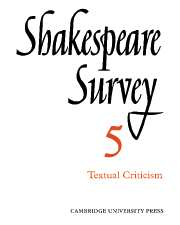Book contents
- Frontmatter
- Restoring Shakespeare: The Modern Editor’s Task
- Suggestions Towards an Edition of Shakespeare for French, German and Other Continental Readers
- The 1622 Quarto and the First Folio Texts of Othello
- An Approach to the Problem of Pericles
- The Shakespeare Collection in the Library of Trinity College, Cambridge
- New Place: The Only Representation of Shakespeare’s House From an Unpublished Manuscript
- Letters to an Actor Playing Hamlet
- Shakespeare’s Imagery: The Diabolic Images in Othello
- Suggestions for a New Approach to Shakespeare’s Imagery
- Shakespeare’s Influence on Pushkin’s Dramatic Work
- Shakespeare on the Flemish Stage of Belgium, 1876–1951
- International Notes
- Shakespeare Productions in the United Kingdom: 1950
- Shakespeare in the Waterloo Road
- The Year's Contributions to Shakespearian Study 1 Critical Studies
- 2 Shakespeares’s Life, Times and Stage
- 3 Textual Studies
- Books Received
- Index
- Plates
Restoring Shakespeare: The Modern Editor’s Task
Published online by Cambridge University Press: 28 March 2007
- Frontmatter
- Restoring Shakespeare: The Modern Editor’s Task
- Suggestions Towards an Edition of Shakespeare for French, German and Other Continental Readers
- The 1622 Quarto and the First Folio Texts of Othello
- An Approach to the Problem of Pericles
- The Shakespeare Collection in the Library of Trinity College, Cambridge
- New Place: The Only Representation of Shakespeare’s House From an Unpublished Manuscript
- Letters to an Actor Playing Hamlet
- Shakespeare’s Imagery: The Diabolic Images in Othello
- Suggestions for a New Approach to Shakespeare’s Imagery
- Shakespeare’s Influence on Pushkin’s Dramatic Work
- Shakespeare on the Flemish Stage of Belgium, 1876–1951
- International Notes
- Shakespeare Productions in the United Kingdom: 1950
- Shakespeare in the Waterloo Road
- The Year's Contributions to Shakespearian Study 1 Critical Studies
- 2 Shakespeares’s Life, Times and Stage
- 3 Textual Studies
- Books Received
- Index
- Plates
Summary
Abuse of the commentators and of the editors is a form of recreation with which many readers of Shakespeare have from time to time diverted themselves. Familiar, perhaps from their early years, with his plays in some well-known and standard text, they come in their maturer days upon remarks that disturb their repose in their long-cherished knowledge or on suggestions that offend their sense of propriety. Such reactions may be wise or unwise according to circumstances and the capacity of the reader; they are at least natural, but only some familiarity with the commentator’s problem will enable even the judicious reader to pass a fair judgement on new suggestions and to reject them, if necessary, with the charitable allowance that the case usually deserves. For the commentator is doing his best to help in what is both a difficult and a delicate task, and only an arrogant assumption of omniscience on his part should call forth the reader’s objurgation.
- Type
- Chapter
- Information
- Shakespeare Survey , pp. 1 - 9Publisher: Cambridge University PressPrint publication year: 1952
- 1
- Cited by

